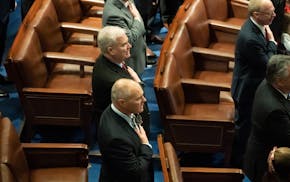If you're still trying to make sense of the political earthquake of 2016 and happen to be reading this in Minnesota, just look east to a key Hillary Clinton firewall that crumbled on election night.
It's now clear that Clinton made a major strategic mistake by taking Wisconsin and its 10 electoral votes for granted, last deigning to visit the state in April. Despite its purple hue, the strategy seemed a safe bet: President Obama easily won Wisconsin twice, by nearly 14 points in 2008 and by just under 7 in 2012.
As Election Day approached, the respected Marquette University poll had Clinton ahead by a comfortable 6-point margin, seemingly ensuring that Wisconsin would continue a Democratic streak in presidential elections that dated back to 1988.
You need only look to beautiful Trempealeau County, just over the border from Winona, to piece together what went wrong for Clinton in Wisconsin and other battleground states. Trempealeau and its rolling hills are home to about 30,000 mostly white, mostly employed Wisconsinites, many of whom work in agriculture. Its largest city is Arcadia, with about 3,000 residents.
It's quite possible Clinton and her data-driven New York/Washington campaign strategists never heard of Arcadia, but they should have. The Wall Street Journal presciently featured the city in a pre-election analysis of small, Midwestern towns that have diversified faster than almost any other part of the country since 2000.
In Arcadia, an influx of Latino immigrants came to milk cows, process chickens and make furniture at Ashley Furniture Industries Inc. There were unfilled jobs, and the workers were needed, but the Journal story describes how the changing face of what was in the late 1990s a virtually all-white town of 2,400 left some longtime residents unsettled. From 2000 to 2014, the percentage of Hispanics in Arcadia grew from 3 percent to 35 percent.
In response, the local parish added a bilingual priest, Latino shops opened on Main Street and the share of students in the school district qualifying for free and reduced-price lunch climbed to 65 percent vs. 20 percent in the late 1990s. The district opened a new middle school to address the surge.
No one knows how many immigrants came to Arcadia illegally — Ashley and other employers told the Journal they have strong verification systems — but Trump's build-the-wall pledge appealed to some residents, as it did in other rural areas across the Midwest.
Mark VanAcker, a 66-year-old veterinarian, told the Journal he was worried about the impact of the immigrant wave on school finances and crime in Arcadia. "There is a high suspicion that people coming into our country without citizenship status are entitled to things we have to work for," he said. "When a politician says that needs to be addressed, we listen."
Although other Arcadia residents told the Journal that immigrant workers and their families were rapidly becoming a valued part of the community, angst over the pace of immigration helps explain what happened on Election Day in western Wisconsin. But it's not the whole story.
Rural Wisconsinites are generally hardworking, law-abiding and protective of their way of life — as seen in cities like Arcadia and counties like Trempealeau. Pocketbook issues matter, small government is preferred, and the Second Amendment is sacred.
Aided by incumbency and facing a more conventional GOP opponent, Obama won Trempealeau by 14 points in 2012. Trump took it by nearly 13, while winning 10 other western Wisconsin counties carried by Obama four years ago. Meanwhile, Clinton received nearly 40,000 fewer votes in Milwaukee County than Obama totaled four years earlier in his re-election bid.
To the surprise of pollsters, pundits and no doubt the Clinton campaign, Wisconsin voted Republican for the first time since 1984 — by a mere 27,000 votes. Trump underperformed Mitt Romney in Republican suburbs of Milwaukee and outperformed him in western and northern Wisconsin and near Green Bay. Rural voters opted for change.
"Trump was an appealing candidate for people who were feeling like rural Wisconsin always gets a raw deal, and people in rural Wisconsin don't get their fair share, and people in cities don't respect them and nobody listens to them or has a clue what is going on there," Kathy Cramer, a University of Wisconsin-Madison professor and author of a book about politics and rural Wisconsin, told the Milwaukee Journal Sentinel.
Clinton ignored them, letting Trump fill the void. She never visited Wisconsin during the presidential campaign and chose to dispatch President and Michelle Obama elsewhere. Madison Mayor Paul Soglin blasted the Clinton campaign Friday, calling its inattentiveness "arrogant" and "cocky." For the record, Obama campaigned in Wisconsin the Saturday before he was re-elected, and Trump visited the state five times during the general election campaign.
Pundits scoffed when Trump came to the Minneapolis-St. Paul International Airport the weekend before the election, but his campaign no doubt viewed the visit as a chance to make a final appeal to western Wisconsin voters whose Twin Cities news media sources provided full coverage. (And for that matter, Trump came closer to winning in Minnesota than any Republican since Ronald Reagan.)
As the postmortem began late last week, Clinton focused blame for her loss on FBI Director James Comey. That's too easy. Clinton's team didn't understand the undercurrents of discontent roiling the Midwest. As a result, her defeat took root in the heartland — among rural, blue-collar voters who were longing for affirmation that they still have a place in 21st century America.
Scott Gillespie is the Star Tribune's editorial page editor.

In wartime and across lifetimes: The memories that run in the blood
To our readers: D.J. Tice is retiring



